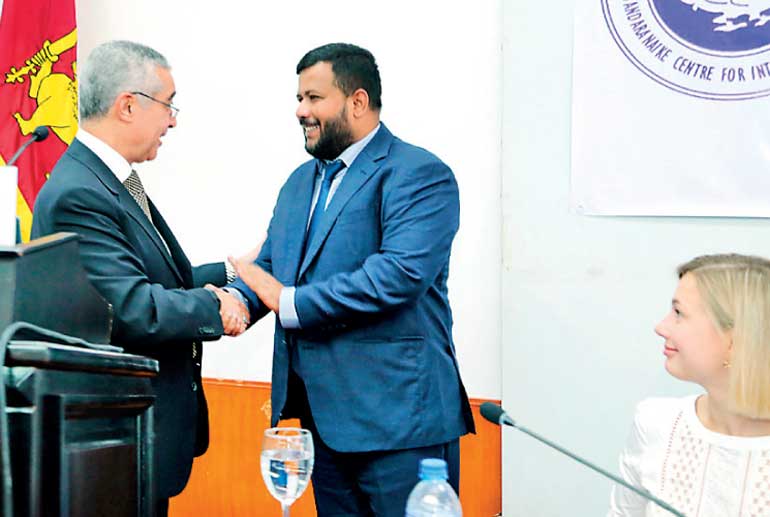Monday Feb 16, 2026
Monday Feb 16, 2026
Tuesday, 28 June 2016 00:12 - - {{hitsCtrl.values.hits}}
Despite the sudden uncertainty in the European market, Sri Lanka is eager for opportunities unfolding in the Brexit aftermath and Sri Lanka’s leading international trade agency DoC is successfully enlisting the WTO to unravel new global opportunities for the country’s growing service exports.
“The new changes from Brexit gives an opening for Sri Lanka to go for a one-to-one trade agreement with UK,” said Minister of Industry and Commerce Rishad Bathiudeen yesterday, addressing the inauguration of the Trade in Services Workshop by the Department of Commerce at BCIS, Colombo.
The interactive awareness seminar is supported by World Trade Organisation (WTO) and Geneva’s Director Trade in Services Division Abdel-Hamid Mamdouh was in attendance. Joining the session were Department of Commerce Director General Sonali Wijeratne, Policy Analyst from the WTO Trade in Services Division Evgeniia Zhuravleva, and many representatives from the private sector including exporters. According to the Department of Commerce, the trade in services discourse is now taking place at multilateral level such as WTO and even economic partnership trading arrangements among member countries.
 Minister of Industry and Commerce Rishad Bathiudeen greets Director Trade in Services Division of WTO Abdel-Hamid Mamdouh as WTO Trade in Services Division Analyst Evgeniia Zhuravleva (right) looks on at the Trade in Services Workshop organised by the Department of Commerce on Monday
Minister of Industry and Commerce Rishad Bathiudeen greets Director Trade in Services Division of WTO Abdel-Hamid Mamdouh as WTO Trade in Services Division Analyst Evgeniia Zhuravleva (right) looks on at the Trade in Services Workshop organised by the Department of Commerce on Monday
“We are witnessing historic developments taking place in global economic regions. We now know that the UK has voted to leave the European Union in Brexit. In this background, we need to look at our present trades with UK and European Union. Almost one-third of our total exports to the world went to the European Union in 2015 at $ 3 billion. This $ 3 b includes 2015 exports to UK as well, which is one billion dollars; 33% of our total exports to EU in 2015 went to the United Kingdom. As for trade with UK, I am pleased to say that since 2010, our exports to UK have grown by 17% by 2015 to total at $ 1 billion; 80% of our exports to the UK in 2015 were apparel, followed by footwear and Ceylon Tea,” said Bathiudeen.
He added: “When we remove UK export numbers in 2015, the total exports to EU are still a significant $ 2 billion. Even if the actual post Brexit separation will take place two years after activation of Article 50, we need to understand that Brexit is a new door that has opened but unlike many international other trade doors, we do not know where this opening will lead to. On the other hand, both UK and EU are valuable trade partners to Sri Lanka. Not only in trade, both UK and EU support us in great many ways and are historic friends of Sri Lanka for which we are always thankful. Therefore we keenly look forward to expand our trade with both these markets. In fact we shall look forward to strengthen bilateral trade as well as multiple other ways of cooperation with both UK and EU in future. The new changes bring opportunities for us. For example, it gives an opening for Sri Lanka to go for a one-to-one trade agreement with UK. I have no doubts that such a prospective agreement will enhance the global trade reform vision of the Government.”
Director Trade in Services Division of WTO Abdel-Hamid Mamdouh addressing the event said that services in trade is a promising sector. “Without services, manufacturing cannot take place. Services are very broad in diverse areas and spread across logistics, ICT, professional services, etc. Today services and their quality, is a determinant of a country’s competitiveness. The concept of trade in services only started after Uruguay GATT talks in 1986.”
“When we open our borders for services, we thought that there should informed dialogue of engagement,” said Department of Commerce Director General Sonali Wijeratne. “While we look at GATT in particular, we want to understand whether agreements on trading services should be the template for all negotiations – be it bilateral or multilateral. Understanding GATT fundamentals is vital. Therefore we have gone into detail on this at today’s session.”
Many economic data indicate that the service sector has considerable potential to the economies of developing countries-an economic growth driver. The 11% of world GDP that was trade in services 10 years ago has increased to 13.2%, by 2014.